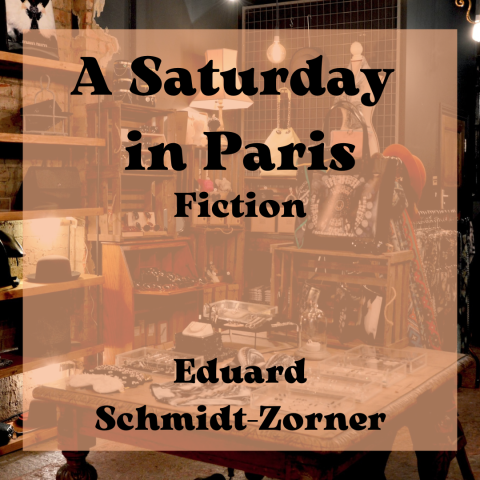A Saturday in Paris

Image by image by Christelle BOURGEOIS on Unsplash
I left my apartment, walked down Rue Buffault, crossed Rue Lafayette, and saw from a distance my friend Loïc, from Brittany. He sat in front of his antique shop, with a Gauloise in the corner of his mouth, and in front of him, a glass of red wine on a small round table. He had just dealt with some customers who had bought nothing and only had complained about the bad times.
His shop was full of rarities such as old radios, boxes full of old photographs, medals and decorations, toys, porcelain dishes, and figurines.
“Can you take my place for a moment? I have to pick something up from the pharmacy,” Loïc asked.
Saturday morning idlers poked their heads into the door but decided to move on. A while later, an old man with a black slouch hat entered the shop.
“Could I have a look at the Meissen porcelain figurines?” He had a slight accent. He pointed to the shelf. There were about ten figures displayed.
He carefully took one of them in his trembling hands, a shepherdess with a lamb, and carefully put it back in slow motion.
I stepped closer to the shelf to see the price. It showed 250 euros.
He said: “It was mine; the figurine and I are what is left of my family. I got it on my Bar Mitzvah. The fascists took over. We had to leave our flat. I was separated from my parents at the station Gare d’Austerlitz, from where we were deported after being rounded up. My father had implored me to go into hiding. I escaped, but never saw my parents and our flat again.
“I was made aware of this antique shop by Mrs Belmonte, who owns a bookshop in Rue Liancourt. I have searched antique shops for years. There are a lot of shops dealing with possessions of holocaust victims.”
“How can you be so sure it is yours?” I asked him.
“Turn the figure over.”
Two Hebrew letters in gold lettering were on the underside. Alef Beit. A.B.
“The initials of Aaron Blatt. That is my name. How much do I owe you?”
“The price tag says EUR 250.”
Loïc returned and I introduced him to Mr Blatt and told him the background.
He said: “Mr Blatt, take the figurine; when it was yours, it is yours”.
“Are you sure? Thanks. You are a good person.”
Loïc dismissed this statement with a wave of his hand: “Money is only printed paper; I like to repair suffering from the past.”
Blatt shook Loïc’s hand. He told me later that they had been ice-cold.
Blatt pulled some documents from his bag: “I cannot produce any evidence to prove my background, but here is my ID card and a letter from the Paris Rabbinate to confirm my details and family history.”
I carefully wrapped the figure in the wrapping tissue that lay on the counter. Blatt took it, almost tenderly, put it in his old leather bag, and with a slight limp left the shop and disappeared, seeming to have dissolved.
Loïc smiled: “He said Mrs Belmonte had recommended my shop?”
I nodded.
“Ah, Mrs Belmonte. She is a bit weird. Has an antiquarian bookshop near the catacombs. She had settled in the 14th arrondissement as a mature woman in the 1960s with her father, who died shortly after their arrival. From where she came, nobody knows. She must be over 100. Strange.
I will tell you what. I will close for the day and we will visit her bookshop. As a book lover, you will be interested, her bookshop is unique.”
Loïc locked his shop and we drove his likewise “antique” Renault 4, via Place de la Concorde, down Boulevard Raspail, past the Cimetière du Montparnasse to Rue Liancourt. When we drove over Boulevard Raspail, Loïc said: “Do you know that we are driving over six million dead? Beneath us are the catacombs of Paris.”
The outside of the bookshop was inconspicuous. It had a plain shop sign over the entrance door: ‘Librairie Belmonte’.
The first thing I noticed when we walked in was that the books were stacked horizontally on the floor-to-ceiling bookshelves, not to be forced to tilt the head and get a stiff neck.
Loïc nudged me. I turned around. In front of me stood a small woman with snow-white hair and a face that belied her age. Her eyes were light, ethereal blue, which made them seem almost entirely white and eerie.
“What can I do for you?” she asked in a dark timbre voice.
“Mr Blatt, whom you directed to my shop, visited us today and collected a porcelain figure. I wanted to show my friend Édouard your bookshop. He’s a book addict.”
“Mr Blatt? But he died six months ago. I attended his funeral.”
Loïc looked confused. “How can a deceased person buy a porcelain figure?”
Mrs Belmonte responded: “But he did, didn’t he?
To change the topic, I said: “You have an impressive collection of books. Probably you are often confronted with the silly question: “Have you read all these books?”
“Yes, I have.”
I looked around. Roughly 5,000 books. Maybe the same amount on the upper floor.
I calculated: generously estimating 6 days of reading time for a book equals 60,000 days, divided by 365 days per year equals 164 years.
The shop seemed out of time, with a wearying, overshadowed atmosphere.
She looked at me penetratingly. “What are you interested in?”
“Poetry, philosophy, contemporary writers. Walser, Dürrenmatt, Houellebecq, Handke.“
“Books contain secrets and mysteries, especially the books on this shelf. Some are nearly 200 years old. This is where our secrets lie. We are moving in a loop, might have died without perceiving it and continue to live in another sphere. It might be the solution to the perception of ‘eternal life.’”
“You have an interesting theory of death”, I said. “I think death is the only calculable and reliable thing in life.”
She pointed to the left. ”Take one of these books and it will reveal your past. Here,” and she pointed to the right. “These books contain wishes which never came true and here in the middle you will find your biggest regrets in life.”
She looked at me and asked: “Have you ever visited the catacombs, this collection of death?”
I shook my head.
“Come with me,” she pointed with her head to the back of the shop.
“She will show you the ‘Chamber of Horrors’,” whispered Loïc.
We walked to the end of the bookshop. She opened a door, ahead of us leading stairs into the basement. We descended, then walked along narrow dimly lit corridors, seemingly a network of old tunnels stretching under Paris, until we reached an extraordinary sight, a part of a subterranean ossuary: Bones and skulls, all stacked neatly, part of the remains of inhabitants from many graveyards from the past to find their final eternal rest in the former limestone mines.
She jumped swiftly up the stairs, turned, and for a moment it seemed to me that I was looking at the face of a young girl.
After I had made my way back up through the semi-darkness, I stood in front of the shelves with the old books that had magically fascinated me. I stood in front of the middle shelf.
I randomly grabbed a book, a thick tome.
“I will take this”, I said.
Mrs Belmonte smiled sadly. “You have a lot of regrets.”
Enjoy more fiction from the incredible MockingOwl Roost contributors and staff.
- Dragons of Io – Part 1 & Part 2 & Part 3
- Memories from the Past
- The Wilderness Between Us – Part 1 & Part 2
- Where Would I Be Without You?
- My World

Eduard Schmidt-Zorner
Eduard Schmidt-Zorner is a translator and writer of poetry, haibun, haiku, and short stories. He writes in four languages: English, French, Spanish, and German and holds workshops on Japanese and Chinese style poetry and prose and experimental poetry. Member of four writer groups in Ireland. Lives in County Kerry, Ireland, for more than 30 years and is a proud Irish citizen, born in Germany. Published in over 180 anthologies, literary journals, and broadsheets in USA, UK, Ireland, Australia, Canada, Japan, Sweden, Spain, Italy, Austria, France, Bangladesh, India, Mauritius, Nepal, Pakistan, and Nigeria. He also writes under his pen name Eadbhard McGowan.





6 Comments
[…] A Saturday in Paris […]
[…] A Saturday in Paris […]
[…] A Saturday in Paris – Haunting Fiction […]
[…] A Saturday in Paris […]
[…] A Saturday in Paris […]
[…] A Saturday in Paris – Speculative Fiction […]